|
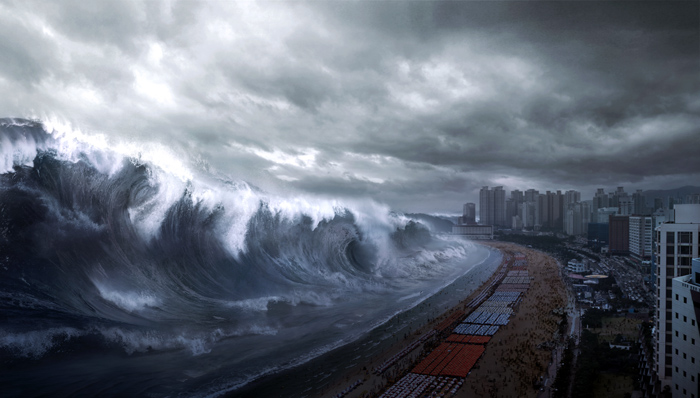
Is a retro/direct set
of
spring tide waves coming to your shoreline? You bet it is,
and it's already underway...
...when
retro planets get out of
control...
By
John Townley
November
2011
We’ve done a couple of articles on retrogrades, from summer
2009’s tidal
metaphor about planetary change
easing in with breathable increments to
2010’s physical description of how
the dance really works over
time. More recent trend articles have focused on the dominance of
Jupiter in
the coming tweens of this century, its benefits and risks. But just now
we are
entering a rare period of intensity determined by the clustering sky
that is
intimately linked to direct and retrograde periods – because
as the planets
cluster, so do extreme alternating direct and retrograde skies. And,
the effects
down below are nothing less than world-changing.
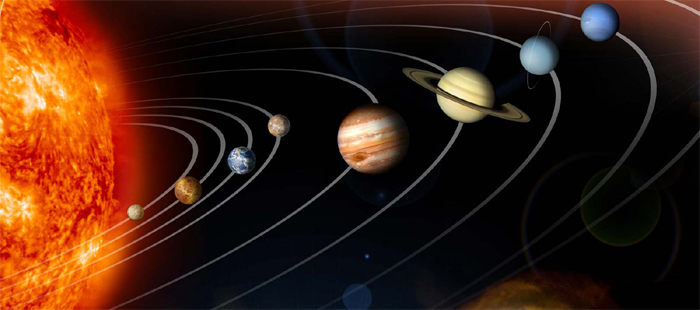
Extended,
alternating retro and direct periods happen when all the planets are
lined up closely in the same part of the sky.
In ordinary times, when the planets are distributed more
evenly here and there around the circle of the sky, there is a running
average
of one or two planets retrograde all year long, and it’s rare
that an
individual is born (or an event happens) with no planets retro
– or,
conversely, with a whole host of them in reverse. Natally, we tend to
give
special emphasis (or rather, de-emphasis) to the one or two planets
retro in a
chart, and in mundane astrology we figure their associations to be
weakened
according to their individual nature (like, don’t make war
when Mars is retro).
But when we see nativities (or periods of history) that are loaded with
retros
or have none at all, realistic interpretation is hard to come by. Like,
is someone with six planets retro so
slow on the uptake as to be just barely functional, or a no-retro
personality
something akin to a go-go super-Aries on speed? Probably the best
commentary,
actually backed by some real statistics, is John McCormick’s
wonderful 1975
Book of Retrogrades, get one
used
if you can find one. There you will see relative frequencies of each
number of
retros along with charts of people particularly representative of the
combination.
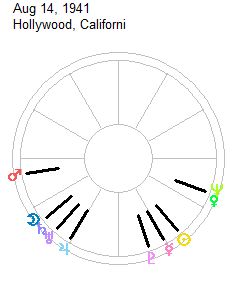
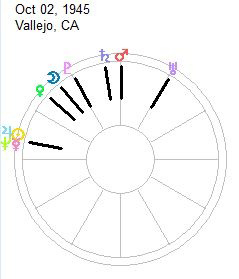
Bowl skies (l) bring a month or so of alternating all-direct and
multiple retros, bundle skies (r) mean up to three months of it.
But there’s a problem with the statistical, averaging
approach: it’s not about probability and
averages, with
extremes happening rarely and by chance. It’s very much regular
cause
and effect, directly related to where the planets are in the sky,
how close they are
to each other, and where we are in our orbit in relation to them. You
can
(should) go back and read the exact
how and why, but
suffice it to say, for our current situation, that when planets bunch
up in the
sky, from a loose bowl chart to a really tight bundle, periods of
all-direct
and many-retro planets increase radically. As long as planets are
clustered
like
that, you get two alternating seasons of all-direct planets (for as
much as
over three
months, from one Mercury retro to the next, such as in the winter of
1993-94 ) then five to six retro planets (or even more).
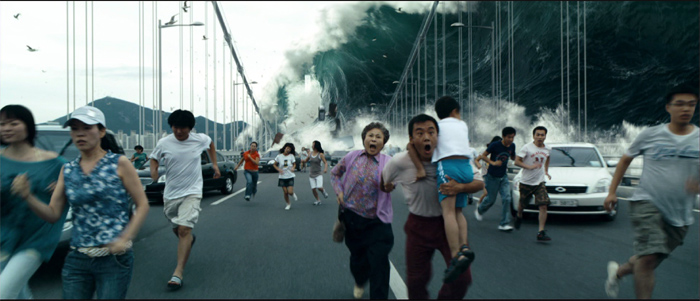
Every couple of
generations, retro-related tidal surges sweep the world and put
everyone on the run.
It’s a phenomenon that happens once every couple of
generations, when the outer planets bunch (or at least are all on one
side of the sky) and then Jupiter and Saturn
(and
briefly Mars) drop inside them. These are watershed periods in
history, as
we explained in our WOW Award-winning article Which
Side Are You On? Events come in
rolling waves, in alternating opposite seasons, sweeping
over the world like massive spring tides with an onshore wind behind
them. One
season the celestial tide of all-direct planets rushes in to reach new
high-water marks (when the Sun is also
inside the bowl/bundle), then rushes out six months later with a skyful
of retrogrades (when the Sun opposes
the bowl/bundle) while we all recover and regroup below, only to be
caught by the
next season’s returning tidal tsunami. It usually ramps up in one
set
of opposing seasons
(like summer/winter) then migrates forward and tapers off during the
next set
(like fall/spring) after which the planetary pattern breaks up.
Depending
on how the middle and outer planets align, that can take up to
five or six years from start to finish.
Most
notable
examples in recent history have been the WWII years, when global
military
dominance was at stake, the early 1980s when the socio-economic swing
back from
the post-War socialist-democratic model began, and the late 1980s and
early
1990s when communism fell and the whole world realigned. The ups and
downs of
each were propelled and magnified by the accompanying celestial spring
tide
effect, making them go to greater extremes than they otherwise would or
perhaps
should. Indeed, students of WWII may note with
fascination how
tightly events (especially in the European theater) tracked the
alternating
periods, with first Germany taking advantage of the flood, while the
Allies
regrouped at the ebb, then a reversal as the advantage in the war
changed
sides, ending with the extreme bundle skies that formed just after VE
Day and
on past the first atom bombs.
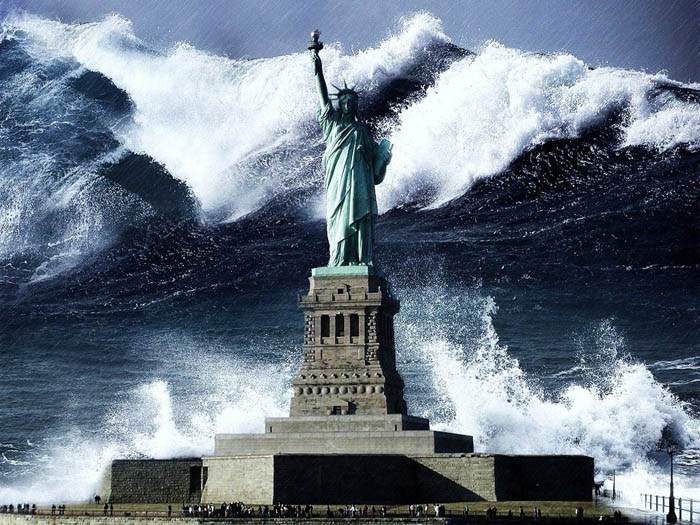
The
full bundle retro tide phenomenon will hit just before America
experiences its first Pluto return.
Historically,
major world changes were already underway before the final set
of
bowl/bundle retro/direct phenomenon reached its fullest. By the
time there were three months of one or the other, as in the early 1990s
or the
end of
WWII, the message of the writing on the wall had already come to pass
and
the wall
itself was being swept away. Right now, we are in the final stages of
this
fairly short period where bowl skies bring on the tides for a while but
not too
long, during which we have already seen a Great Recession, Arab Spring,
and
still more to come. It has been (and still will be) a harrowing
ride, both in
America and in other parts of the world, but it’s only a
brief taste of once and future extremes. “And
except
those days should be
shortened, there should no flesh be saved”
(Matthew 24:22) gets the spirit of
it.
The next time we
get the really intense bundle
skies and months-long direct/retro tidal
waves,
similar to late WWII and the fall of communism, will be in the winter
of
2020-21. Assuming you’re going to live to see that next big
one, now is the
time to learn from today’s ongoing dress rehearsal.
Not
a
newsletter subscriber already? Subscribe
Free Here!
--
Breaking news from
around the globe, plus articles, reviews, it's all happening there,
changes daily...
|

